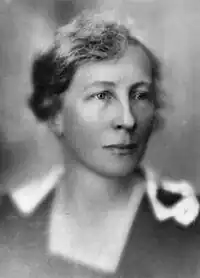Lillian Moller Gilbreth
Lillian Evelyn Moller Gilbreth (May 24, 1878 – January 2, 1972) was an American psychologist, industrial engineer, consultant, and educator. She was known for her works with psychology to time-and-motion studies. She was called "a genius in the art of living."[1]
Lillian Moller Gilbreth | |
|---|---|
 Gilbreth in 1921 | |
| Born | Lillie Evelyn Moller May 24, 1878 |
| Died | January 2, 1972 (aged 93) Phoenix, Arizona, US |
| Nationality | American |
| Alma mater | University of California, Berkeley Brown University |
| Occupation(s) | Ergonomics expert Management consultant Professor |
| Known for | Seminal contributions to human factors engineering and ergonomics; Therblig |
| Spouse | Frank Bunker Gilbreth |
| Children | 12, including Ernestine Gilbreth Carey, Frank Bunker Gilbreth, Jr., and Robert M. Gilbreth |
| Awards | National Academy of Engineering (elected 1965) Hoover Medal (1966) |
Gilbreth, one of the first female engineers to earn a Ph.D.. She and her husband, Frank Bunker Gilbreth, were experts who work to the study of industrial engineering.[2]
References
- Carol Kennedy (2007-01-01). Guide to the Management Gurus. Random House Business. ISBN 9781905211029. OCLC 655247876.
- David Ferguson. "That Most Famous Dozen". The Gilbreth Network. Retrieved 2015-09-23.
This article is issued from Wikipedia. The text is licensed under Creative Commons - Attribution - Sharealike. Additional terms may apply for the media files.